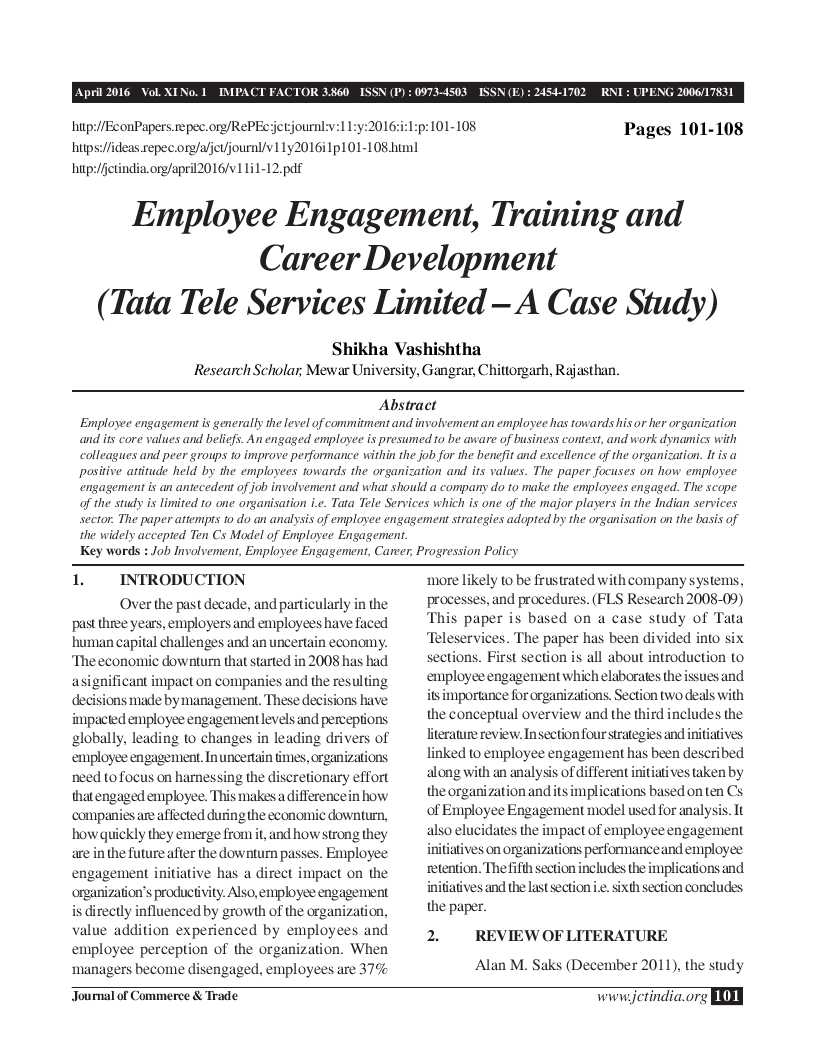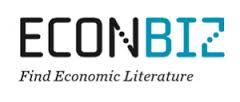Employee Engagement, Training and Career Development (Tata Tele Services Limited – A Case Study)
DOI:
https://doi.org/10.26703/jct.v11i1.234Keywords:
Job Involvement, Employee Engagement, Career, Progression PolicyAbstract
Employee engagement is generally the level of commitment and involvement an employee has towards his or her organization and its core values and beliefs. An engaged employee is presumed to be aware of business context, and work dynamics with colleagues and peer groups to improve performance within the job for the benefit and excellence of the organization. It is a positive attitude held by the employees towards the organization and its values. The paper focuses on how employee engagement is an antecedent of job involvement and what should a company do to make the employees engaged. The scope of the study is limited to one organisation i.e. Tata Tele Services which is one of the major players in the Indian services sector. The paper attempts to do an analysis of employee engagement strategies adopted by the organisation on the basis of the widely accepted Ten Cs Model of Employee Engagement.
Downloads
Metrics
References
“Factors Persuading Employee Engagement and Linkage of EE to Personal & Organizational Performance” Hafiz Abdur Rashid Ammar Asad M.Phil Mian Muhammad Ashraf M.Phil, Journal of Contemporary Research in Business Institute of Interdisciplinary Business Research September 2011 vol 3, no 5
“Employee Engagement: The Key to Improving Performance” by Solomon Markos (Corresponding author)PhD, M. Sandhya Sridevin Professor, , International Journal of Business and Management Vol. 5, No. 12; December 2010
Drivers of Employee Engagement in Indian Organizations Rama J. Josli & J.S. Sodhi “The Indian Journal of Industrial Relations”, Vol. 47, No. 1, July 2011
Essential Components of Employee Engagement - A Study with Reference to TNSTC, Kumbakonam Swaminathan J and Rajasekaran ,Advances In Management, Vol. 3 (12) Dec. (2010)
Determinants of Employee Engagement in a Private Sector Organization: An Exploratory Study , Sharma Baldev R. and Raina Anupama, “Advances In Management Vol. 3 (10) Oct. (2010)
“Predictors & Outcomes of Employee Engagement:”Implications for the Resource-based View Perspective, Jyotsna Bhatnagar & Soumendu Biswas, The Indian Journal of Industrial Relations, Vol. 46, No. 2, October 2010
Employee Engagement predictors: A study at GE Power & Water Dr. P. Vaijayanthi , Mr. K. A. Shreenivasan, Ms. Suma Prabhakaran School of Management, SASTRA University, Thanjavur., International Journal of Global Business, 4 (2), 60-72, December 2011.
Saradha H and Harold Andrew Patrick, Ph.D “Employee Engagement in Relation to Organizational Citizenship Behaviour in Information Technology Organizations” Third Annual Global Business, IT and Management for Economic Development Conference (BITMED) 2011
T. Shankar and J. Bhatnagar,(2010),‘Work-life Balance, Employee Engagement, Emotional Consonance/ Dissonance & Turnover Intention’, Indian Journal of Industrial Relations, Vol 46, No.1, July 2010.
Vaijayanthi P. and K. A. Shreenivasan and Suma Prabhakaran, ‘Employee Engagement predictors: A study at GE Power & Water’, International Journal of Global Business, 4 (2), 60- 72, December 2011
Vishal Gupta and Sushil Kumar (2013), ‘Impact of performance appraisal justice on employee engagement: a study of Indian professionals’, Emerald Group Publishing Limited, Employee Relations Vol. 35 No. 1, 2013 pp. 61-78.
Soumendu Biswasa, Arup Varmab and Aarti Ramaswami (2013),’ Linking distributive and procedural justice to employee engagement through social exchange: a field study in India’, The International Journal of Human Resource Management, 2013, Vol. 24, No. 8, 1570–1587
Kumar Alok & D.Israel (2012), ‘Authentic Leadership & Work Engagement’, The India Journal of Industrial Relations, Vol 47, No.3.
Elaine Farndal, Veronica Hope Hailey, Clare Kelliher, Marc van Veldhoven (2011), “A study of the link between Performance Management and Employee Engagement in Western multinational corporations operating across India and China”, SHRM Foundation.

Downloads
Published
How to Cite
Issue
Section
License
Copyright (c) 2016 Shikha Vashistha

This work is licensed under a Creative Commons Attribution 4.0 International License.














